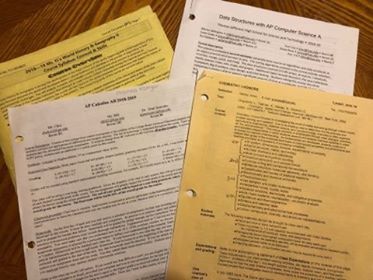Cause for Course Standardization
Standardizing curriculums in classes at Jefferson could hold huge opportunities for both students and teachers

The multiple syllabi passed out by teachers are often cause for worry and confusion between classes.
April 5, 2019
When it comes to school, it’s natural for students, especially Jefferson students, to compare themselves- from grades and extracurriculars to classes and teachers. That will never change. But, what can change is the structure of our classes, specifically through course standardization.
Knowing that someone who takes the same class as you, but had an easier test or less homework can be infuriating. One may believe they’ve worked harder or as hard as another student with a different teacher, just to end up with a lower grade on an assignment or in the class. Not only is this a hit to a student’s morale, but can lead to a student believing that they could’ve had an easier time, and that the differences among classes is unfair.
While there truly could be unfair distinctions within classrooms, it’s impossible for students to prove that as they weren’t present for another teacher’s lessons. The extent of a teacher’s knowledge on different topics will contrast with another teacher teaching the same class. Often, teachers will have conflicting opinions on different topics and how much emphasis should be placed on them. Again, this is natural, and is no fault of our teachers. Nonetheless, it can prove to be an unnecessary difficulty for students.
For most classes at Jefferson, quizzes and exams are worth around 40 to 50 percent of students’ grades. Due to discrepancies in curriculums across teachers, tests can be labelled as more difficult for certain teachers.
That’s where course standardization comes in. Yes, course standardization could alleviate the worries and insecurities that slip into the student population, and it would also prove to be a huge benefit to teachers.
Course standardization would require the same content to the same extent and emphasis across the board. In addition to content, the same quizzes, project, and exams would be implemented.
Through course standardization, teachers would have to spend less time preparing courses and lessons. Rather than taking time out of their day to plan class time and make their own tests, teachers can focus their energies on teaching. Additionally, since courses would be planned prior to class time, resources could be used yearly and also be provided to new teachers. This would also allow for teachers to teach a wider range of courses. With collaboration by teachers to plan courses, not only will courses be fine tuned, but a variety of multimedia components and interactive activities can be implemented.
At Jefferson, all math courses are standardized. All teachers provide the same notes, homework packets, quizzes, and tests. At least in this case, not as many students are found complaining about unfair tests and grades. Math is an easier course to employ course standardization due to it being so concrete and developed over several centuries. Compared to math, chemistry and biology are relatively newer subjects and teachers hold varying amounts of knowledge pertaining to the subject. Yet, it is possible with time and would ultimately result in students stressing less about taking tests and teachers stressing less about creating tests.
However, with standardized courses, teachers may feel limited in what they can do in their own classrooms. If course design conflicts with a teacher’s teaching style, a teacher may begin to lose interest in their job. Loss of interest would ultimately be a bigger issue than differences within classes. This is why input from teachers about standardization is of utmost importance. Yearly meetings to go over curriculums would allow for teachers, new and old, to voice their opinions and for changes to be made when necessary. Students on the other hand, may feel that they aren’t given enough room to grow with such a constricted curriculum. At least at Jefferson, teachers may choose to hold optional lectures during eighth periods or could provide students with other resources and more diverse content for enrichment.
Standardized curriculums could ensure that students across the board are provided with a curriculum that is adequate, supported, and vetted by multiple teachers. If implemented at Jefferson and schools across the nations, students and teachers alike could find themselves with a lot less worry, and a lot more appreciation for education.





